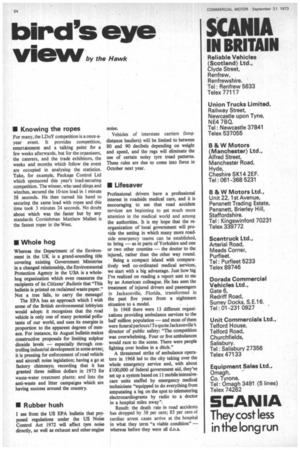bird's eye
Page 56

If you've noticed an error in this article please click here to report it so we can fix it.
view bythe Hawk • Knowing the ropes
For many, the LDoY competition is a once-ayear event. It provides competition. entertainment and a talking point for a few weeks afterwards, but for the organisers, the caterers, and the trade exhibitors, the weeks and months which follow the event are occupied in analysing the statistics. Take, for example, Package Control Ltd which sponsored this year's load-securing competition. The winner, who used slings and winches, secured the 10-ton load in 1 minute 58 seconds. He then turned his hand to securing the same load with ropes and this time took 3 minutes 24 seconds. No doubt about which was the faster but by any standards Cornishman Matthew Mallett is the fastest roper in the West.
• Whole hog
Whereas the Department of the Environment in the UK is a grand-sounding title covering existing Government Ministries in a changed relationship, the Environmental Protection Agency in the USA is a whole. hog organization which even reassures the recipients of its Citizens' Bulletin that "This bulletin is printed on reclaimed wastepaper." Not a tree falls, to carry the message!
The EPA has an approach which I wish some of the British environmental lobbyists would adopt: it recognizes that the road vehicle is only one of many potential pollutants of our world, and uses its energies in proportion to the apparent degrees of menace. For instance, its August bulletin makes constructive proposals for limiting sulphur dioxide levels — especially through controlling industrial development in some areas;, it is pressing for enforcement of road vehicle and aircraft noise legislation; having a go at factory chimneys; recording that it has granted three million dollars in 1973 for waste-water treatment plants; and lists the anti-waste and litter campaigns which are having success around the country.
• Rubber hush
I see from the US EPA bulletin that proposed regulations under the US Noise Control Act 1972 will affect tyre noise directly, as well as exhaust and other engine noise.
Vehicles of interstate carriers (longdistance hauliers) will be limited to between 80 and 90 decibels depending on weight and speed, and the regs will eliminate the use of certain noisy tyre tread patterns. These rules are due to come into force in October next year.
• Lifesaver
Professional drivers have a professional interest in roadside medical care, and it is encouraging to see that road accident services are beginning to get much more attention in the medical world and among the authorities. It is my hope that the reorganization of local government will provide the setting in which many more roadside emergency teams can be established, to bring — as in parts of Yorkshire and one or two other counties — the doctor to the injured, rather than the other way round.
Being a compact island with comparatively well co-ordinated medical services, we start with a big advantage. Just how big I've realized on reading a report sent to me by an American colleague. He has seen the treatment of injured drivers and passengers in Jacksonville, Florida. transformed in the past five years from a nightmare situation to a model.
In 1968 there were 13 different organizations providing ambulance services to the half million population — and most of them were funeral parlours !To quote Jacksonville's director of public safety: "The competition was overwhelming. Four or five ambulances would race to the scene. There were people fighting over bodies in a ditch."
A threatened strike of ambulance operators in 1968 led to the city taking over the whole emergency service and, with about £100,000 of federal government aid, they've set up a system based on 11 mobile intensivecare units staffed by emergency medical technicians "equipped to do everything from amputating a leg on the spot to telemetering electrocardiograms by radio to a doctor in a hospital miles away".
Result: the death rate in road accidents has dropped by 38 per cent: 85 per cent of cardiac arrest cases arrive at the hospital in what they term "a viable condition" — whereas before they were all d.o.a.
















































































































































































